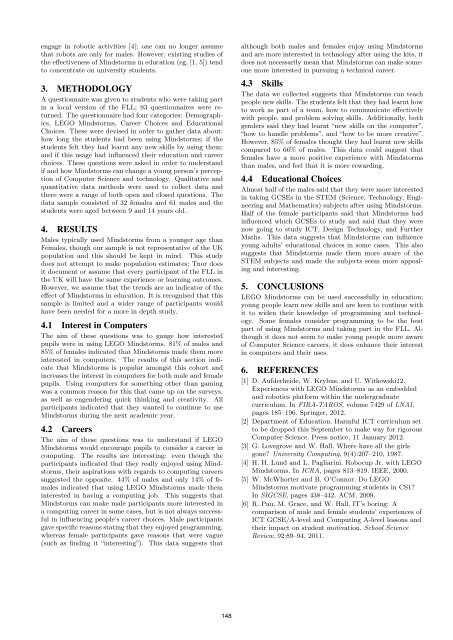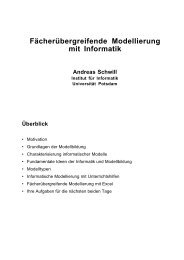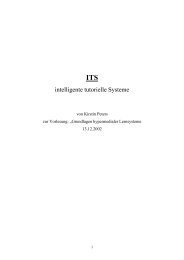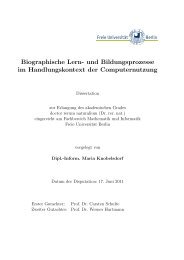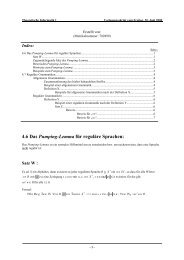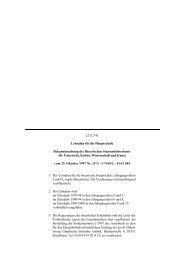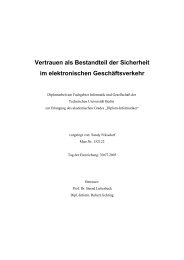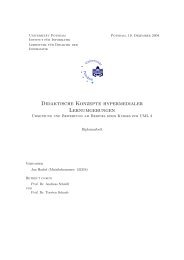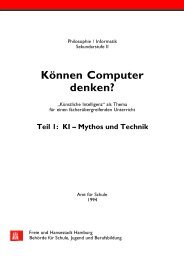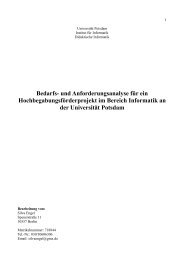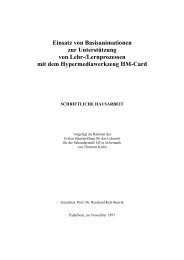Maria Knobelsdorf, University of Dortmund, Germany - Didaktik der ...
Maria Knobelsdorf, University of Dortmund, Germany - Didaktik der ...
Maria Knobelsdorf, University of Dortmund, Germany - Didaktik der ...
You also want an ePaper? Increase the reach of your titles
YUMPU automatically turns print PDFs into web optimized ePapers that Google loves.
engage in robotic activities [4]; one can no longer assume<br />
that robots are only for males. However, existing studies <strong>of</strong><br />
the effectiveness <strong>of</strong> Mindstorms in education (eg, [1, 5]) tend<br />
to concentrate on university students.<br />
3. METHODOLOGY<br />
A questionnaire was given to students who were taking part<br />
in a local version <strong>of</strong> the FLL; 93 questionnaires were returned.<br />
The questionnaire had four categories: Demographics,<br />
LEGO Mindstorms, Career Choices and Educational<br />
Choices. These were devised in or<strong>der</strong> to gather data about:<br />
how long the students had been using Mindstorms; if the<br />
students felt they had learnt any new skills by using them;<br />
and if this usage had influenced their education and career<br />
choices. These questions were asked in or<strong>der</strong> to un<strong>der</strong>stand<br />
if and how Mindstorms can change a young person’s perception<br />
<strong>of</strong> Computer Science and technology. Qualitative and<br />
quantitative data methods were used to collect data and<br />
there were a range <strong>of</strong> both open and closed questions. The<br />
data sample consisted <strong>of</strong> 32 females and 61 males and the<br />
students were aged between 9 and 14 years old.<br />
4. RESULTS<br />
Males typically used Mindstorms from a younger age than<br />
Females, though our sample is not representative <strong>of</strong> the UK<br />
population and this should be kept in mind. This study<br />
does not attempt to make population estimates; Tnor does<br />
it document or assume that every participant <strong>of</strong> the FLL in<br />
the UK will have the same experience or learning outcomes.<br />
However, we assume that the trends are an indicator <strong>of</strong> the<br />
effect <strong>of</strong> Mindstorms in education. It is recognised that this<br />
sample is limited and a wi<strong>der</strong> range <strong>of</strong> participants would<br />
have been needed for a more in depth study.<br />
4.1 Interest in Computers<br />
The aim <strong>of</strong> these questions was to gauge how interested<br />
pupils were in using LEGO Mindstorms. 81% <strong>of</strong> males and<br />
85% <strong>of</strong> females indicated that Mindstorms made them more<br />
interested in computers. The results <strong>of</strong> this section indicate<br />
that Mindstorms is popular amongst this cohort and<br />
increases the interest in computers for both male and female<br />
pupils. Using computers for something other than gaming<br />
was a common reason for this that came up on the surveys,<br />
as well as engen<strong>der</strong>ing quick thinking and creativity. All<br />
participants indicated that they wanted to continue to use<br />
Mindstorms during the next academic year.<br />
4.2 Careers<br />
The aim <strong>of</strong> these questions was to un<strong>der</strong>stand if LEGO<br />
Mindstorms would encourage pupils to consi<strong>der</strong> a career in<br />
computing. The results are interesting: even though the<br />
participants indicated that they really enjoyed using Mindstorms,<br />
their aspirations with regards to computing careers<br />
suggested the opposite. 44% <strong>of</strong> males and only 14% <strong>of</strong> females<br />
indicated that using LEGO Mindstorms made them<br />
interested in having a computing job. This suggests that<br />
Mindstorms can make male participants more interested in<br />
a computing career in some cases, but is not always successful<br />
in influencing people’s career choices. Male participants<br />
gave specific reasons stating that they enjoyed programming,<br />
whereas female participants gave reasons that were vague<br />
(such as finding it “interesting”). This data suggests that<br />
148<br />
although both males and females enjoy using Mindstorms<br />
and are more interested in technology after using the kits, it<br />
does not necessarily mean that Mindstorms can make someone<br />
more interested in pursuing a technical career.<br />
4.3 Skills<br />
The data we collected suggests that Mindstorms can teach<br />
people new skills. The students felt that they had learnt how<br />
to work as part <strong>of</strong> a team, how to communicate effectively<br />
with people, and problem solving skills. Additionally, both<br />
gen<strong>der</strong>s said they had learnt “new skills on the computer”,<br />
“how to handle problems”, and “how to be more creative”.<br />
However, 85% <strong>of</strong> females thought they had learnt new skills<br />
compared to 66% <strong>of</strong> males. This data could suggest that<br />
females have a more positive experience with Mindstorms<br />
than males, and feel that it is more rewarding.<br />
4.4 Educational Choices<br />
Almost half <strong>of</strong> the males said that they were more interested<br />
in taking GCSEs in the STEM (Science, Technology, Engineering<br />
and Mathematics) subjects after using Mindstorms.<br />
Half <strong>of</strong> the female participants said that Mindstorms had<br />
influenced which GCSEs to study and said that they were<br />
now going to study ICT, Design Technology, and Further<br />
Maths. This data suggests that Mindstorms can influence<br />
young adults’ educational choices in some cases. This also<br />
suggests that Mindstorms made them more aware <strong>of</strong> the<br />
STEM subjects and made the subjects seem more appealing<br />
and interesting.<br />
5. CONCLUSIONS<br />
LEGO Mindstorms can be used successfully in education;<br />
young people learn new skills and are keen to continue with<br />
it to widen their knowledge <strong>of</strong> programming and technology.<br />
Some females consi<strong>der</strong> programming to be the best<br />
part <strong>of</strong> using Mindstorms and taking part in the FLL. Although<br />
it does not seem to make young people more aware<br />
<strong>of</strong> Computer Science careers, it does enhance their interest<br />
in computers and their uses.<br />
6. REFERENCES<br />
[1] D. Auf<strong>der</strong>heide, W. Krybus, and U. Witkowski12.<br />
Experiences with LEGO Mindstorms as an embedded<br />
and robotics platform within the un<strong>der</strong>graduate<br />
curriculum. In FIRA-TAROS, volume 7429 <strong>of</strong> LNAI,<br />
pages 185–196. Springer, 2012.<br />
[2] Department <strong>of</strong> Education. Harmful ICT curriculum set<br />
to be dropped this September to make way for rigorous<br />
Computer Science. Press notice, 11 January 2012.<br />
[3] G. Lovegrove and W. Hall. Where have all the girls<br />
gone? <strong>University</strong> Computing, 9(4):207–210, 1987.<br />
[4] H. H. Lund and L. Pagliarini. Robocup Jr. with LEGO<br />
Mindstorms. In ICRA, pages 813–819. IEEE, 2000.<br />
[5] W. McWhorter and B. O’Connor. Do LEGO<br />
Mindstorms motivate programming students in CS1?<br />
In SIGCSE, pages 438–442. ACM, 2009.<br />
[6] R. Pau, M. Grace, and W. Hall. IT’s boring: A<br />
comparison <strong>of</strong> male and female students’ experiences <strong>of</strong><br />
ICT GCSE/A-level and Computing A-level lessons and<br />
their impact on student motivation. School Science<br />
Review, 92:89–94, 2011.


